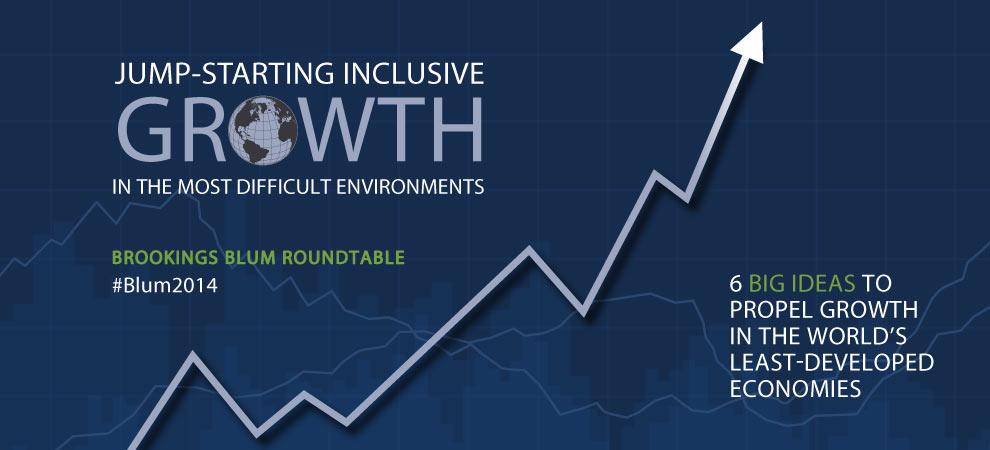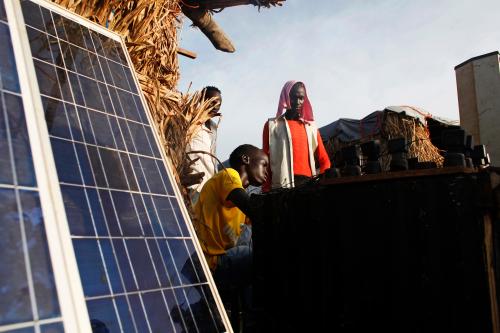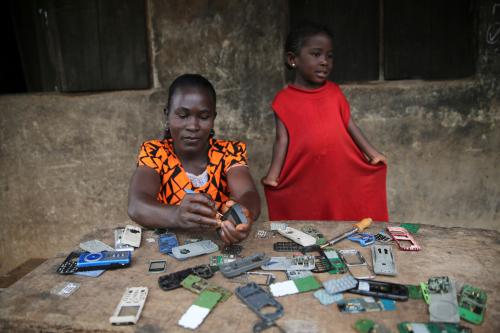On August 7-9, the Global Economy and Development Program at Brookings hosted its 11th annual Brookings Blum Roundtable on Global Poverty in Aspen, Colorado. Ahead of this year’s event, titled “Jump-Starting Inclusive Growth in the Most Difficult Environments,” Brookings experts and colleagues discussed six big ideas to tackle development challenges in the world’s most impoverished states.
Innovative Platforms for Public-Private Dialogue
Jane Nelson discusses the importance of corporate-government engagement in development outcomes, and explores new, accountable models of public-private engagement that are beginning to emerge. Yet much work is still needed to sustain, replicate and scale what works.
Accounting for Unpredictability in Private Investment
Though governments in conflict settings need investment more than most, the risks present a vast challenge to private sector activity. V. Shankar (Standard Chartered Bank) discusses how governments seeking to attract business must prioritize establishing regulation, providing infrastructure and security, and promoting inclusive policies.
The Evolution of Technology Diffusion and the Great Divergence
Diego Comin (Dartmouth College) explains that while technologies disseminate rapidly from rich to poor countries, poor countries struggle to use them with the same degree of intensity and versatility, suggesting that the potential for technological “leap-frogging” is over-hyped. Moving forward, poor countries must invest in the right kinds of knowledge so that imported technologies can be more effectively harnessed.
Scaling a New Model of Development
Andrew Herscowitz (United States Agency for International Development) explains how President Obama’s Power Africa initiative mitigates commercial risks for businesses considering investment in poor countries through the provision of a range of publically provided tools. Instead of only offering official aid, this new model also leverages private capital, organizes around private sector needs, focuses on individual transactions, and coordinates U.S. and donor efforts.
From Mega-Projects to Transformative Change
Large investment projects are enormously complex undertakings and take vast effort and attention to successfully pull off. While the direct economic benefits of such projects can seem big, Homi Kharas explains why the indirect, spillover benefits are much greater, are more important for generating truly transformational change, and can catalyze the next generation of investments.
Diversifying Growth in Light of Economic Complexity
Muhammed Yildirim (Harvard University) explains why it is difficult for some countries to shift economies away from dependence on extractive industry. Rather than traditionally trying to move down the value-chain from extractive industries, the best strategy for these countries should be to attempt larger, more aggressive leaps into new, diversified, areas that lend themselves to the accumulation of skills.
The Brookings Blum Roundtable is an annual forum for global leaders, entrepreneurs and practitioners to discuss innovative ideas and advance groundbreaking initiatives to alleviate global poverty. Learn more »
The Brookings Institution is committed to quality, independence, and impact.
We are supported by a diverse array of funders. In line with our values and policies, each Brookings publication represents the sole views of its author(s).







